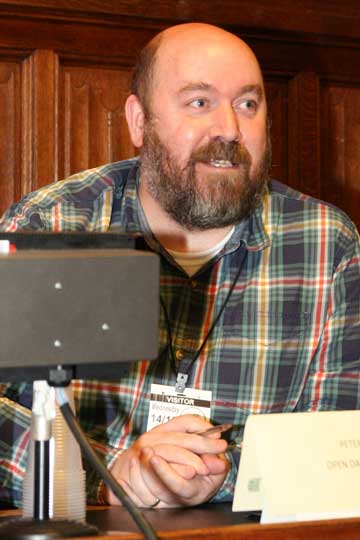
The All-Party Parliamentary Group on leasehold and commonhold reform invited Peter Wells, of the Open Data Institute to address the meeting on December 14 2016.
The Leasehold Knowledge Partnership had been accepted as an accelerated start-up by the ODI.
Peter’s speech in full:
Hello, thank you for inviting me. I’m from the Open Data Institute (ODI). You may not have heard of us.
We were founded 4 years ago by Sir Tim Berners-Lee, the inventor the web, and Sir Nigel Shadbolt. Our CEO is Jeni Tennison, she apologises for not being here. So do I as I’ve ended up creating an all-male panel. That’s bad.
We are global. We connect, enable and inspire people to innovate with data. Or “to get stuff done that make things better by being more open” as I sometimes say.
I am not a housing or leasehold specialist, my job is to get data to people who need it. Leasehold Knowledge Partnership are part of our current UK startup programme. They’ve been helping us understand the problems in leasing, we’ve been helping them understand whether more data can help.
At the ODI we think of data as a new form of infrastructure. It has become essential infrastructure without us realising it.
Like most physical infrastructure – for example roads – data creates most value when it is as open as possible while respecting privacy.
When data is open and available for anyone to use it is easier for people to use it to make decisions and solve problems.
Take leaseholds. Let’s imagine if more information was open while respecting the privacy of homeowners.
People expect easy access to data in the web age.
Many homebuyers use sites like RightMove and Zoopla as they look for a home. Opening up leasehold data would enable those services to help people make an informed decision. For example they could compare terms with other properties, leasehold or not, in the area and see what’s reasonable. Some of the cases Patrick mentioned happened because people lacked information when buying a home.
Conveyancers and estate agents would have access to more data too. They could get things done faster and give better advice to homebuyers.
Researchers would be able to model the market; help people understand how it is working and suggest improvements.
Legislators would be able to get better information about problems, where legislation is needed or where soft power could be used to influence things
With better access to data government could test a policy idea, like the ones Phillip suggested, in a region before deciding whether to roll it out nationally
Much of this data is available but it is locked away. In government offices, in the offices of house building firms, in law firms or in contracts held by leaseholders and freeholders.
Some of our big public registries and institutions – things like the Land Registry, Ordnance Survey, the Met Office — were created to make this type of information available to people who need it but it feels like they haven’t adapted to changing times and 21st century needs.
Getting this data open can take time and cost money. Not that much, technology can be cheaper than some people might tell you. But getting the data open and using it to change markets, like leasehold, can also affect business models. That’s usually more significant.
We need to support those organisations to change their business models; move to a future where we have data infrastructure that is as open as possible while respecting privacy; and help meet society’s 21st century needs. That might mean they also need to help open up data held outside government.
In closing I’d ask both the members of the APPG and all of the leasehold experts in the room to think about the power of the web, what people expect in the modern age and how the tools and techniques of the web and data can help build a better housing market.
One that can reduce the number of cases like those that Patrick Collinson has written about over the last few months.





 Questions from APPG attendees: Ground rent sale prices have risen tenfold since 2007
Questions from APPG attendees: Ground rent sale prices have risen tenfold since 2007





















